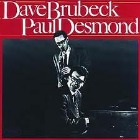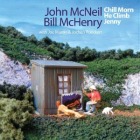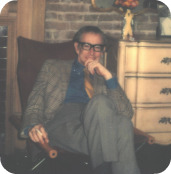Doug Ramsey's Blog, page 8
December 5, 2010
Weekend Extra: "Blue In Green" In Blue And Green
Someone went overboard matching the color scheme of this video to the name of the tune, and the sound is distorted, but here is an exquisite 1962 version of "Blue in Green" by Bill Evans with Chuck Israels and Paul Motian. Be patient while the YouTube poster gets his commercial out of the way.
There was a time when the big three television networks had programs that presented music of quality. CBS-TV's Camera 3, the original source of this clip, went out of business in 1980. Thanks to Evans scholar Mike Harris for calling the video to our attention. Mr. Harris recorded the Evans Secret Sessions box set.
December 3, 2010
The New Brubeck Documentary
Dave Brubeck is getting a lot of attention. With his 90th birthday three days away, he is the subject of performance reviews, articles and editorials in dozens of newspapers from The New York Times to Britain's Guardian. His music is being played over the  air to a degree unprecedented since the early 1960s, when "Take Five" was a popular hit. Viewers of cable television in the United States and the BBC in Great Britain can celebrate Brubeck's 90th birthday by watching a new documentary. Dave Brubeck, In His Own Sweet Way traces his life, career, influences, and effect on modern music and culture. The program is running this evening at 9 on BBC4 and in the US on Monday, Brubeck's birthday, on the TCM channel at 5 pm EST, 2 pm PST.
air to a degree unprecedented since the early 1960s, when "Take Five" was a popular hit. Viewers of cable television in the United States and the BBC in Great Britain can celebrate Brubeck's 90th birthday by watching a new documentary. Dave Brubeck, In His Own Sweet Way traces his life, career, influences, and effect on modern music and culture. The program is running this evening at 9 on BBC4 and in the US on Monday, Brubeck's birthday, on the TCM channel at 5 pm EST, 2 pm PST.
With Clint Eastwood as executive producer and occasional on-screen guide, the documentary directed by Bruce Ricker combines film, videotape, audio recordings and photographs from a variety of sources and uses them to tell of Brubeck's transformation from budding cattleman to an artist whose music reached around the world. It includes a previously unreleased conversation between Brubeck and Walter Cronkite, sequences of the classic Brubeck quartet with Paul Desmond, Eugene Wright and Joe Morello, and fellow musicians evaluating Brubeck's importance.
Ricker is impressive in his skill at coalescing and blending disparate elementsespecially pieces of unrelated interviewsinto a coherent and entertaining story. The consummate filmmaker Eastwood was often in the editing room with him. The rare films include Brubeck's teacher Darius Milhaud at work composing, Desmond and Brubeck playing in the early days and lots of footage and photos of the large, affectionate and talented family of six children headed by Brubeck and his wife Iola. The program explains Mrs. Brubeck's crucial role in managing the original quartet's connection to college campuses, a move that established the band as a force in jazz and started a cultural trend. Desmond is amusing in his graphic description of Brubeck's tendency to wildness at the keyboard in the early years of their partnership.
playing in the early days and lots of footage and photos of the large, affectionate and talented family of six children headed by Brubeck and his wife Iola. The program explains Mrs. Brubeck's crucial role in managing the original quartet's connection to college campuses, a move that established the band as a force in jazz and started a cultural trend. Desmond is amusing in his graphic description of Brubeck's tendency to wildness at the keyboard in the early years of their partnership.
Apparently because of their closeness to Eastwood, the documentary brings in pop singer Jamie Cullum and crossover pianist David Benoit to discuss Brubeck's music, with occasional interjections by Bill Cosby. Eastwood's friend director George Lucas helps  make Eastwood's case that fellow northern Californians like Brubeck, Jack London and Ansel Adams are a breed apart. Sting and Yo-Yo Ma also make appearances, Ma in a lively cello duet with Brubeck's youngest son Matthew. The actor Alec Baldwin does the film's narration, which is spare, low-key and infrequent. The sound and pictures make the point: Dave Brubeck achieved success without varying from quiet, rigorous devotion to his principles. This documentary will charm his fans and advocates. It may make his detractors reconsider.
make Eastwood's case that fellow northern Californians like Brubeck, Jack London and Ansel Adams are a breed apart. Sting and Yo-Yo Ma also make appearances, Ma in a lively cello duet with Brubeck's youngest son Matthew. The actor Alec Baldwin does the film's narration, which is spare, low-key and infrequent. The sound and pictures make the point: Dave Brubeck achieved success without varying from quiet, rigorous devotion to his principles. This documentary will charm his fans and advocates. It may make his detractors reconsider.
TCM will precede the Brubeck documentary with a showing at 1:30 pm EST of the 1962 British movie All Night Log, a modern retelling of Shakespeare's Othello, in which Brubeck and his old friend Charles Mingus make cameo appearances and play a duet.
Recent Listening: Randy Weston, McNeil/McHenry Quartet
Randy Weston, The Storyteller (Motéma). This is the latest chapter in the 84-year-old pianist's long-running love story about Africa. Weston's African Rhythms Sextet includes the great [image error]trombonist Benny Powell in one of his last recordings, alto saxophonist T.K. Blue, bassist Alex Blake, drummer Lewis Nash and conga specialist Neil Clarke. He made the album almost exactly a year ago in performance at Dizzy's Club Coca Cola in New York. With the rhythm section generating heat near combustion levels, some of the ensemble passages approximate the excitement of the Dizzy Gillespie big band of the late forties that blended Afro-Cuban rhythms into jazz. Solos by all hands express the passionsometimes smoldering, sometimes volcanic that has typified Weston's music for six decades. The entire CD is a highlight, but Weston devotees will find particular stimulation and a good deal of humor in the reworking of his classic "Hi Fly" and its recapitulation, "Fly Hi." Nash and Clarke achieve moments of jaw-dropping percussion virtuosity. Weston's piano playing continues to embody the spirits of Thelonious Monk and Duke Ellington.
John McNeil/Bill McHenry, Chill Morn He Climb Jenny (Sunnyside). McNeil tempers his trumpet virtuosity with shots of wry. In tenor saxophonist McHenry he has found his ideal counterpart and foil. In this successor to their superb 2008 CD Rediscovery, the pianoless quartet reprises and, to put it mildly, reinterprets additional pieces from the repertoires of the Gerry Mulligan and Chet Baker quartets of the 1950s. There are hints at the timbres and moods of those groups, but this is no ghost band. Free but tethered to tradition, it is in the spirit of 21st century downtown Manhattan and Brooklyn jazz. Most often, bassist Joe Martin and drummer Jochen Rueckert lay down measured swing that leaves McNeil and McHenry at their leisure to roam freely withinand occasionally outside ofthe bounds of "Carioca," "Moonlight in Vermont," "Aren't You Glad You're You" and from the pen of Russ Freeman, "Batter Up," the tricky blues "Bea's Flat" and "Maid in Mexico." Throughout, the horns contrive little duet riffs that they manage to make sound as if they had just thought of them. Three of the tunes depart from the west coast play list. Thad Jones' "Three And One" and Wilbur Harden's loping "I Got Rhythm" artifact "Wells Fargo" inspire some of the quartet's most passionate work of the date, which was before an audience at the Cornelia Street Café in Greenwich Village. Miles Davis' "Pfrancing," is primarily a blues background for McNeil's parting announcement. That enigmatic album title? It's an anagram of the leaders' names.
at the timbres and moods of those groups, but this is no ghost band. Free but tethered to tradition, it is in the spirit of 21st century downtown Manhattan and Brooklyn jazz. Most often, bassist Joe Martin and drummer Jochen Rueckert lay down measured swing that leaves McNeil and McHenry at their leisure to roam freely withinand occasionally outside ofthe bounds of "Carioca," "Moonlight in Vermont," "Aren't You Glad You're You" and from the pen of Russ Freeman, "Batter Up," the tricky blues "Bea's Flat" and "Maid in Mexico." Throughout, the horns contrive little duet riffs that they manage to make sound as if they had just thought of them. Three of the tunes depart from the west coast play list. Thad Jones' "Three And One" and Wilbur Harden's loping "I Got Rhythm" artifact "Wells Fargo" inspire some of the quartet's most passionate work of the date, which was before an audience at the Cornelia Street Café in Greenwich Village. Miles Davis' "Pfrancing," is primarily a blues background for McNeil's parting announcement. That enigmatic album title? It's an anagram of the leaders' names.
December 1, 2010
Dave Brubeck At 90: Was He Cool Or What?
With Dave Brubeck's 90th birthday five days away, anticipation of the event is materializing in news stories, interviews, radio airplay, web tributes and accolades from colleagues and admirers. Marc Myers' piece in The Wall Street Journal includes this paragraph:
Clean living, a happy marriage and global popularity have made Mr. Brubeck a media darling--and a target of envy. "Even in the '50s I'd hear critics and musicians say, 'Oh, Brubeck, he's different'--meaning separate from the rest," Mr. Brubeck said. "Others described my music as West Coast cool or light. Listen to our version of 'Look for the Silver Lining' from 1952. Tell me, what's cool about that?"
You be the judge. The recording is from 1951, not '52, but 59 years later, it's understandable that anyone could lose track of a year. This was an NBC Radio live remote from the Surf Club in Hollywood. The record label lists ony Brubeck, Paul Desmond and bassist Wyatt Ruther. The drummer is Herb Barman.
Cool? Please use the comment link at the bottom of this post.
Other Matters: Weather Report, Part 1
Other Matters: Weather Report, Part 2
Woody Herman First Herd, December 10, 1945
Neil Hefti, arranger
Woody Herman, vocal
Sonny Berman, trumpet solo
Bill Harris, trombone solo
November 28, 2010
Recent Listening: Brad Goode
Brad Goode, Tight Like This (Delmark). During his Chicago days, Goode worked through his influences, notably Dizzy Gillespie and Clifford Brown, into early individuality. He has a Gillespie moment during his muted solo on the exotic 1942 Xavier Cugat song "Nightingale," but it's a rare example of his playing a direct quote. Goode has serious fun exercising his trumpet virtuosity. Creativity and taste balance his technical skill so that his [image error]smears, swoops, glissandos, flawless interval leaps and notes in the stratosphere serve the music. Louis Armstrong's solo on "Tight Like This" (1928) and Bix Beiderbecke's on "Changes" (1927) are among the early milestones of recorded jazz trumpet. They may have had an effect on Goode, but it would take microscopic analysis of his playing on those tunes to turn up traces of anything resembling imitation. His approach on "Tight Like This," while spectacular and often high above the horn's normal range, is relatively conservative in content. Elsewhere, it's another story. In their solos on "Changes," both he and pianist Adrean Farrugia go adventuring outside the borders of the harmonic structure, abetted by bassist Kelly Sill and drummer Anthony Lee, who shine throughout the album.
In other familiar material, the four often loosen or tighten the time within set tempos. Their elastic rhythmic collaboration produces stimulating tension and release in Irving Berlin's "Reaching For the Moon." 1940s trumpet icon Freddie Webster's "Reverse the Charges" finds Goode puckish in a muted workout on slightly altered "I Got Rhythm" changes. Lee's drum commentary punctuates Sill's spirited solo on the piece. Farrugia constructs a solo mainly using fragments until he builds into full employment of both hands and displays a rich harmonic imagination. With the rhythm section surging in a fast ¾ treatment, Goode floats into "Softly, As in a Morning Sunrise" to create a solo of remarkable fluidity and continuity of ideas. He plays his ballad "Midwestern Autumn" muted and close to the microphone in a mood of reflection. The progressive harmonies of "Climbing Out" allow freedom that Goode and Farrugia revel in, with the trumpeter making joyous octave jumps. "Summary," "The River" and "Bob's Bounce" are additional evidence that Goode is a composer of substance as well as a formidable improviser. This band deserves attention. It rewards close listening.
November 27, 2010
Great Solos: Lester Young, "Sometimes I'm Happy"
The tenor saxophonist recorded this masterpiece in 1943 with pianist Johnny Guarnieri, bassist Slam Stewart and drummer Sid Catlett. He had rejoined Count Basie in high spirits. They were to be dashed the following year when he was drafted into a depressing Army experience, but this is the buoyant pre-war Lester.
Prez's final 12 bars made such an impression on Oscar Peterson that he almost never played "Sometimes I'm Happy" without quoting them at the end. Peterson was far from the only musician who bonded with the phrase. For a generation of tenor saxophonists, it was part of the doxology. Pianist Jack Brownlow, who played with Young in Los Angeles after the war, wrote lyrics to it. With permission of the Brownlow estate, here they are. Feel free to play it again and sing along beginning at 2:48.
I can find a ray on the rainiest day.
If I am with you, the cloudy skies all turn to blue.
My disposition really changes when you're near.
Every day's a happy day with you, my dear.
©Jack Brownlow, 1995
Compatible Quotes: Lester Young
Well, the way I play, I try not to be a 'repeater pencil', ya dig? Originality's the thing. You can have tone and technique and a lot of other things but without originality you ain't really nowhere. Gotta be original.Lester Young
When Lester plays, he almost seems to be singing; one can almost hear the words.Billie Holiday
In some ways Lester Young is the most complex rhythmically of any musician. He does some things which are just phenomenal.Lee Konitz
Anyone who doesn't play like Lester Young is wrong.Brew Moore
November 25, 2010
Thank You For Paul Desmond
 It has become a Rifftides tradition to remember Paul Desmond's birthday. The 86th anniversary of his birth coincides with the American celebration of Thanksgiving, as did the 51st, his last. For the occasion in 1976, Devra Hall cooked a turkey dinner for Desmond and her parents, Jim and Jane. She took the photograph that afternoon. Here's the story of the end of that part of the day, told by Devra in Take Five: The Public and Private Lives of Paul Desmond.
It has become a Rifftides tradition to remember Paul Desmond's birthday. The 86th anniversary of his birth coincides with the American celebration of Thanksgiving, as did the 51st, his last. For the occasion in 1976, Devra Hall cooked a turkey dinner for Desmond and her parents, Jim and Jane. She took the photograph that afternoon. Here's the story of the end of that part of the day, told by Devra in Take Five: The Public and Private Lives of Paul Desmond.
"It was a very quiet dinner. Paul was not feeling well, but he was clearly happy not to be home alone. He didn't have to say a word around my folks. They talked a blue streak, usually, but he was just very comfortable. My fondest recollection is that I made him dinner on his last birthday."
The senior Halls and Desmond went back to Jim and Jane's apartment when they left Devra's, and on the way stopped at the Village Vanguard. Thelonious Monk was performing there. Between sets, they all gathered in the Vanguard's kitchen, the closest thing the club has to a Green Room. In the book, Jim tells about it.
It was the most coherent conversation I ever had with Thelonious, in the kitchen with Paul and me and Thelonious. I had a sort of nodding acquaintance with Monk, but he and Paul really connected. I'm not even sure what they talked about, just standing around in that kitchen, going through old memories and things. It was nice.
I wish that Desmond and Hall had sat in with Monk at the Vanguard. Alas, Paul almost never sat in with anyone, including the night he and I went to hear Bill Evans and Bill all but begged him to play. But that's another story. It's in the book. In lieu of a collaboration with Monk, let's listen to Desmond solo in a relatively little known performance of "Stardust," a tune that he and Dave Brubeck recorded several times over the years. This was 1953, a productive and creative year for the early edition of the Brubeck quartet.
If you saw a slightly different version of this post here last year, please be patient. You're likely to see it again next year.
Happy Thanksgiving
Doug Ramsey's Blog
- Doug Ramsey's profile
- 2 followers




